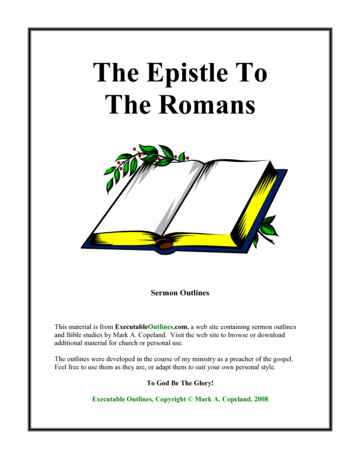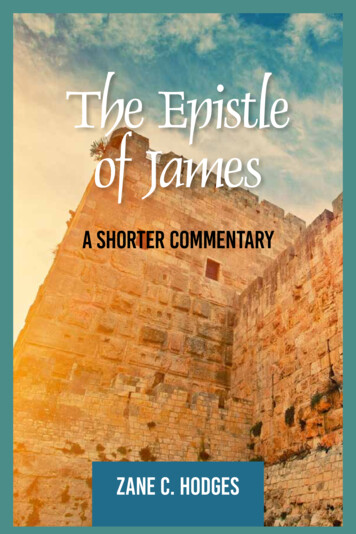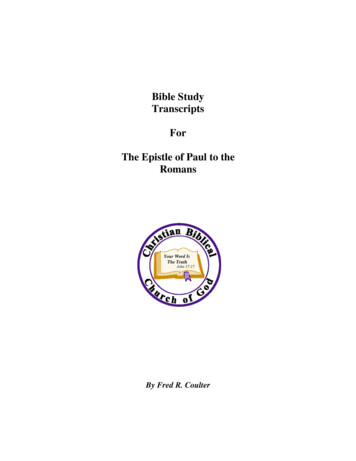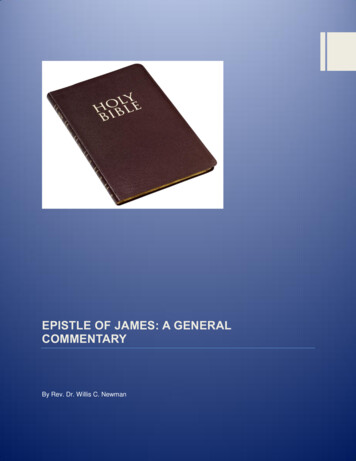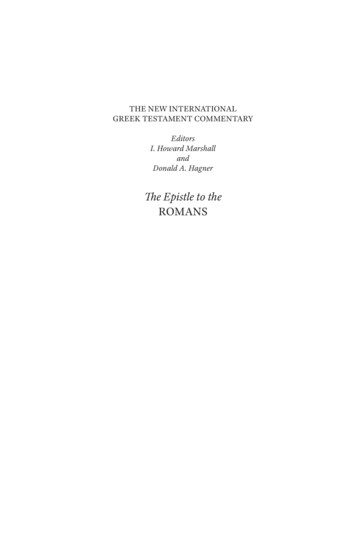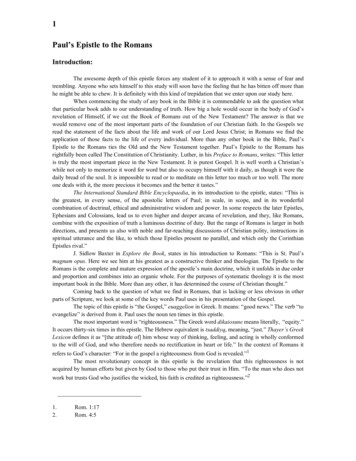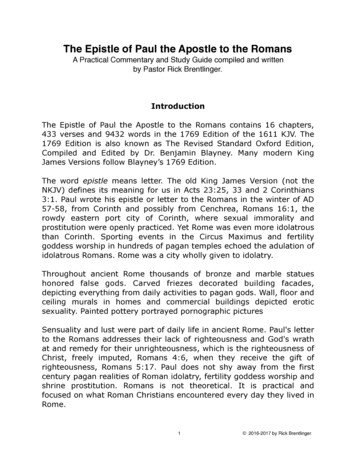
Transcription
The Epistle of Paul the Apostle to the RomansA Practical Commentary and Study Guide compiled and writtenby Pastor Rick Brentlinger.IntroductionThe Epistle of Paul the Apostle to the Romans contains 16 chapters,433 verses and 9432 words in the 1769 Edition of the 1611 KJV. The1769 Edition is also known as The Revised Standard Oxford Edition,Compiled and Edited by Dr. Benjamin Blayney. Many modern KingJames Versions follow Blayney’s 1769 Edition.The word epistle means letter. The old King James Version (not theNKJV) defines its meaning for us in Acts 23:25, 33 and 2 Corinthians3:1. Paul wrote his epistle or letter to the Romans in the winter of AD57-58, from Corinth and possibly from Cenchrea, Romans 16:1, therowdy eastern port city of Corinth, where sexual immorality andprostitution were openly practiced. Yet Rome was even more idolatrousthan Corinth. Sporting events in the Circus Maximus and fertilitygoddess worship in hundreds of pagan temples echoed the adulation ofidolatrous Romans. Rome was a city wholly given to idolatry.Throughout ancient Rome thousands of bronze and marble statueshonored false gods. Carved friezes decorated building facades,depicting everything from daily activities to pagan gods. Wall, floor andceiling murals in homes and commercial buildings depicted eroticsexuality. Painted pottery portrayed pornographic picturesSensuality and lust were part of daily life in ancient Rome. Paul's letterto the Romans addresses their lack of righteousness and God's wrathat and remedy for their unrighteousness, which is the righteousness ofChrist, freely imputed, Romans 4:6, when they receive the gift ofrighteousness, Romans 5:17. Paul does not shy away from the firstcentury pagan realities of Roman idolatry, fertility goddess worship andshrine prostitution. Romans is not theoretical. It is practical andfocused on what Roman Christians encountered every day they lived inRome.1 2016-2017 by Rick Brentlinger
Beyond the erotic and salacious, ancient Rome was an incrediblymodern city. In the first century AD, six aqueducts, drawing on 130outlying reservoirs, supplied water to homes and businesses and to170 free public bath houses and 500 fountains.The Circus Maximus in first century Rome seated 150,000 spectators.It was enlarged by Emperor Trajan after AD 98 to accommodate250,000 spectators on marble seats. Its immense size, approximately680 yards long and 160 yards wide, provided room for spectacularevents. Flooded, the stadium provided a watery battleground for ships.Drained, there was a huge oval track for chariot races.Above the Circus Maximus, Cybele's temple loomed on the PalatineHill. The white stone steps of Cybele’s temple caught the eye of everyspectator in the Circus Maximus. In the dim light of dawn and thefading light of sunset, Cybele's Temple seem to float in the air aboveRome. The idolatry and shrine prostitution practiced in Cybele's Templeis the specific historical and religious context of Paul's letter tostruggling Christians in Rome.Over the 2000 years since Paul's day, Rome has built up the landaround the Palatine Hill so that today, it hardly seems like a hill.Ancient Rome is now buried beneath as much as 40 feet of fill dirt.Context is importantTo understand the Bible, we must factor in biblical, cultural, doctrinal,historical, linguistic and religious context. In Romans 1:26-27, thecontext isn't two gay guys or two gay gals who fall in love andcovenant to spend their lives together as a couple.1. The biblical context is Paul making an argument against idolatryby summing up the Old Testament record of pagan Gentile worshipand citing specific instances where God gave up ancient Israel for herpaganism and idolatry, not homosexuality, not gays and lesbians, nottranssexuals and transgender folks.2. The cultural context is the greatest pagan city of the ancientworld, an idolatrous tableau featuring hundreds of pagan templeswhere multitudes worshiped false gods.2 2016-2017 by Rick Brentlinger
3. The doctrinal context is righteousness. God requiresrighteousness for salvation. We lack righteousness, as evidenced bythe pagan idolatry Paul references. God provides righteousness as afree gift to anyone who wants it, including pagan idolaters, Rom 5:17.4. The historical context is mid-first century Rome about 25 yearsafter the resurrection of Christ, where the main problem was worshipof false gods, not gays or lesbians or transgendered people.5. The linguistic context is Paul using the Greek word, akatharsian,in Romans 1:24 and 6:19, the same word used in the LXX or GreekSeptuagint to describe idolatry and shrine prostitution. Paul driveshome his point by using the Greek word latreuō in v. 25, which wetranslate in English as, served. This word, in the Greek Septuagint,always refers to serving false gods. Paul used these words withpurpose, to indicate he was referring to shrine prostitutes and theirunholy worship of false gods. Paul further drives home his point byusing the phrase, arsenes en arsesin in v. 27 or men with men. This isa clear intertextual echo of arseno in Lev 18:22 and 20:13. Both areclear references to shrine prostitutes and were recognized as such bymen like Philo, a Jewish intellectual and a contemporary of Jesus andPaul and a fellow Jew although not a fellow believer in the Lord JesusChrist.6. The religious context is shrine prostitution in which Cybele thePhrygian mother goddess, was worshiped by temple prostitutes in atleast five of Cybele's pagan temples in Rome in the mid-first centuryAD plus another temple to Jupiter and Minerva (Cybele being knownas Minerva when associated with Jupiter Optimus Maximus in Rome).Understanding the Bible in context is not:a. changing the meaning of scriptureb. twisting scripturec. re-interpreting scriptured. taking scripture out of contexte. reading modern views into scripturef. rewriting historyg. advocating lawlessnessh. attacking biblical holinessi. eisogesic manipulation3 2016-2017 by Rick Brentlinger
Understanding and interpreting the Bible in context is standing for thehistoric truth of God by obeying 2 Timothy 2:15 and "rightly dividingthe word of truth."Paul’s reasons for writing Romans1. He wrote to prepare the way for his first visit to Rome and hismissionary journey to Spain, 1:10–15; 15:22–29.2. He wrote to present the righteousness of God - that the gospel ofChrist teaches, we are saved by grace alone through faith alone in theLord Jesus Christ alone, to a church that had not yet received theteaching of an apostle.3. He wrote to explain the relationship between Jews and Gentiles inGod’s plan of redemption. Jewish Christians were being rejected byGentile Christians (see 14:1) because Jewish believers still observedJewish dietary laws and holy days, 14:2–6.Romans is unique in that most of Paul’s other letters were written tochurches in which he had personally ministered. Yet although he knewmany Christians in Rome and lists their names at the end of his letter,Paul had never visited Rome.In Romans Paul lays the doctrinal foundation of Christianity, that Godrequires righteousness and mankind lacks righteousness, therefore,God provides righteousness as a free gift to all who will receive it.Romans and the revelation of the righteousness of God in the gospel isPaul's doctrinal masterpiece. It is interesting to note that the apostleJohn wrote to seven churches which are in Asia, Revelation 1:4. Theapostle Paul also wrote to seven churches: Corinth, Thessalonica,Galatia, Ephesus, Philippi, Colosse and Rome.The opening sentence of Romans contains 126 words in the KJV. Longcomplex sentences are characteristic of Paul’s writing style, Galatians1:1-5, Ephesians 1:3-14. The Apostle John’s writing style is different;short and simple yet profound sentences, 1 John 4:8-19.This illustrates how God used the education, personality, linguisticability and thought processes of the human authors of the Bible to4 2016-2017 by Rick Brentlinger
color what they wrote, yet what they wrote is free from error andexactly as God intended, 2 Pet 1:20-21, 2 Tim 3:16-17. Each humanauthor of the Bible had his own unique style yet God used them torecord exactly what the Lord wanted to be included in His word. In asimilar way, God uses our individuality, our personality, our gifts andtalents, to serve God and minister to others.Think of Romans in this wayAttempting to understand Paul’s Epistle to the Romans withoutfactoring in Cybele the fertility goddess and shrine prostitution is assilly as trying to understand terrorism in New York City on September11, 2001 without factoring in the terrorist attack on the World TradeCenter.Discussion Questions1. Why should we study Paul’s letter to the Romans, 2 Timothy 2:15,3:16-17?2. Some churches teach that, to keep from learning false doctrine,people should only study the Bible under the guidance of a priest.What does the Bible say about this, 1 John 2:27, John 16:13, 1 Peter2:5-9?3. The first word of Romans tells us the name of the human author.Who wrote Romans? What do we mean when we say Paul wasthe human author of Romans?4. What is Saul/Paul doing when we first see him in the Bible, Acts7:58, 8:1?5. Before he got saved, Saul was devoutly religious, zealous for Godand a passionate defender of Judaism, yet he was completely wrong his life changed radically when he got saved. Why?6. If a man as educated, passionate and devout as Saul could beunsaved and completely wrong, how can you be sure you are right inyour religious beliefs?5 2016-2017 by Rick Brentlinger
7. When you read the story of Saul’s conversion in Acts 9:1ff, whate n c o u ra g e s y o u t o b e l i e v e h i s c o n v e r s i o n w a s g e n u i n e ?8. When you hear about someone getting saved today, whate n c o u ra g e s y o u t o b e l i e v e t h e i r c o n v e r s i o n i s g e n u i n e ?9. Have you had a genuine experience of of being saved by the livingChrist in your own life?6 2016-2017 by Rick Brentlinger
Romans Chapter 1The grand theme of Romans is Righteousness.1. God requires righteousness2. We lack righteousness3. God provides righteousness as a free giftRighteousness and the Gospel in Romans1:1-3:20 - Man's need of righteousness3:21-26 - God's provision of righteousness4:1-25 - By faith, man receives this righteousness5:1-21 - Jesus Christ is this righteousness6:1-8:39 - Righteousness is produced in us by the Holy Spirit9:1-11:36 - Why Israel rejected this righteousness12:1-16:27 - Practical righteousness in the Christian lifeExtended Outline of RomansI. Greetings and Introduction (1:1–15)II. Theme (1:16-17)III. Condemnation: Need For God’s Righteousness (1:18–3:20)A. Unrighteous Gentiles (1:18–32)B. Unrighteous Jews (2:1–3:8)C. Unrighteous Mankind (3:9–20)IV. Justification: Provision of God’s Righteousness (3:21–5:21)A. The Source of Righteousness (3:21–31)B. The Example of Righteousness (4:1–25)C. The Blessings of Righteousness (5:1–11)D. Imputation of Jesus’ Righteousness (5:12–21)7 2016-2017 by Rick Brentlinger
V. Sanctification: Demonstration of God’s Righteousness (6:1–8:39)VI. Restoration: Israel’s Reception of God’s Righteousness (9:1–11:36)VII. Application: Behavior of God’s Righteousness (12:1–15:13)VIII. Conclusion and Benediction for the Righteous (15:14–16:27)1:1 - Paul - Romans begins with the name of its human author. Paulwas originally called by his Jewish name, Saul. After his dramaticconversion to Christ in Acts 9, he began using his Roman name, Paul.As the apostle to the Gentiles, Rom 11:13, 15:16, Acts 9:15, 22:21,Galatians 1:16, Ephesians 3:8, 1 Timothy 2:7, this name change wasappropriate. Paul begins his letter by telling us he was:a servant - or a slave of Jesus Christ. This is an amazing statementwhen we consider Paul’s background as a free born Roman citizen,Acts 7:58, 8:1-3, 9:1-2, 22:28, 1 Cor 15:9, 1 Tim 1:13-15. Is itpossible that Paul was or had been a man of wealth or at least, a manfrom a wealthy Jewish family, Acts 24:26 and 28:30, Philemon 18?Would avaricious Felix hope to receive money from Paul, to be set free,if Paul was a poor man or from a poor family? Some have speculatedthat perhaps Paul was the rich young ruler, Matthew 19:16–30, Mark10:17–3, Luke 18:18–30, who came to Jesus with a question abouteternal life and went away sorrowful: for he had great possessions. Idon’t believe that because it hardly seems even a remote possibility.Yet if Paul was not rich, what other ways could he have afforded torent a house for two whole years while he was a prisoner of theRomans? Luke makes a point of phrasing it, “two whole years.” Coulda poor man afford to rent a decent house in Rome for two whole years,where he could receive high ranking Jewish leaders and others? Wouldthe Jewish leaders of Rome, referred to by Luke as the “chief of theJews,” Acts 28:17, respond to a summons from a poor man living in ahovel?The idea in asking these questions about Paul is to get you thinkingabout what the Bible says in context and the historical circumstances8 2016-2017 by Rick Brentlinger
in which Paul preached and ministered. Luke wrote under inspiration ofthe Holy Spirit and every word he wrote is important for God’spurposes. Travel was expensive in the first century yet Paul traveledoften, sometimes by ship and on foot, sometimes with an entourage.St. John Chrysostom, AD 349-407, tells us Paul worked at his trade oftentmaking (Acts 18:3), to support himself. Ellicott’s, A New TestamentCommentary For English Readers, 1878, says: “The fact that St. Paulhad learnt this trade is not inconsistent with the comparative opulencesuggested by his education both in boyhood at Tarsus and at the feetof Gamaliel in Jerusalem.”In the first century AD, the population of Rome was about one millionto one and a quarter million people. Of this number, about one thirdwere slaves, most of them from countries Rome conquered in battle.Many slaves in Rome were from Europe and Asia Minor.Discussion Questions1. Why does Paul call himself a servant? Matthew 20:25-27, 23:11,Luke 22:27, Philippians 2:5ff. Was it because Jesus was a servant?Was it because Paul was an authentic disciple of Jesus? See #3.2. What happened to Paul that he willingly became a servant of God?Acts 9:1ff.3. What does it mean when Paul tells us to follow him as he followedChrist? Acts 26:29, Romans 11:14, Galatians 3:1, 4:12, 1 Cor 4:16,11:1, 1 Thess 1:6, 2 Thess 3:7, 9, 1 Tim 1:16, 2 Tim 3:10-14When Jesus began His public ministry in Matthew, He was dealing withbearded, circumcised, law-keeping, pork-abstaining, Sabbathworshiping, Moses-following, gospel-rejecting, unsaved Jews in theland of Israel who refused to receive Jesus as their Messiah.When we get to the Book of Acts, God is still dealing with the Jews butis also beginning to segue to ministry to Gentiles, Matthew 28:18-20,Acts 1:8. In the Acts period, we witness a gradual turning away fromIsrael because Jews as a nation rejected the gospel, Acts 13:45-46,18:5-6, 28:17, 23-28.9 2016-2017 by Rick Brentlinger
The Pauline epistles tell us to follow Paul as He followed Jesus insteadof simply telling us to follow Jesus because we are on the grace side ofCalvary (OT Law vs. NT Grace). That is because Jesus was the JewishMessiah to Israel, Isaiah 53, who ministered signs and wonders toJews living under the law of Moses in the land of Israel, Romans 15:8.Paul was Jewish but he was also the apostle to the Gentiles, Romans11:13. As Christians we certainly witness to Jews about Jesus. Godgladly saves individual Jews who accept Jesus but Israel as a nationhas been removed from the place of blessing in this age because as anation, they rejected their Messiah, King Jesus, Romans 11:25.4.5.6.7.8.What does it mean to be on the law side of Calvary, Rom 6:14?What does it mean to be on the grace side of Calvary?What event is the dividing line between law and grace?Does God really expect us to follow Paul?Does God really expect us to be His servants?Saul of Tarsus was a great enemy of the early Christian church. Inorder to reject Jesus and the Bible, critics of Christianity must explainaway the conversion of Paul. George Lyttelton, 1709-1773, studiedPaul’s dramatic conversion in an attempt to disprove Christianity. Hebecame a Christian as a result of studying the life and conversion ofPaul. In his essay, "Observations on the Conversion of St. Paul" (Thisarticle is found in the classic set, The Fundamentals, edited by R.A.Torrey and A.C. Dixon and others, Vol. II, page 353.) Lyttelton listsfour possibilities for what happened to Paul on the Damascus road inActs 9.A. Paul was an impostor who preached what he knew to be false,with intent to deceive (he really didn’t see the risen Christ but lied andsaid he did).B. Paul was a fanatic with a vivid imagination (he sincerelythought he saw the risen Christ but really did not).C. Paul was deceived by the fraud of others (who somehowtricked him into thinking he saw the risen Christ).10 2016-2017 by Rick Brentlinger
D. Paul's conversion happened the way he described it, thereforeChristianity is true. (Paul really did see the risen Christ and Christianityis true because Christ is alive).9. Discuss problems you see with possibilities A, B and C.an apostle - An apostle had a special calling, gift and office. Are thereany biblical apostles today? No, there are no biblical apostles today inthe sense of men who were chosen by our Lord Jesus Christ to fill thescriptural office and who possess biblical apostolic authority and theapostolic office, Matthew 10:1ff., 1 Corinthians 12:28.Although some Christians believe that apostles working wonders, withsigns and miracles, has been normal Christianity for the last twothousand years, the facts of history and scripture rightly divided,strongly disagree. Since those who profess to be apostles today usethe book of Acts to prove that they are also apostles, wise Christianswill keep the following facts in mind.A. Acts is a transitional book, segueing from ministry to Israelite Jewsto ministry to Gentiles outside Israel, Num 25:14, Rom 11:1, KJV.B. When events in Acts 2 occurred, the New Testament had not beenwritten. For that reason, God used signs and wonders to authenticatethe preaching of the apostles whom Jesus had chosen. One of thesigns God used was speaking in tongues. No one spoke unintelligiblegibberish at Pentecost, Acts 2 and no one spoke in prayer languagetongues or heavenly tongues or tongues of angels at Pentecostbecause the biblical gift of tongues is the ability to speak a real earthlylanguage one had not previously learned; not an angelic language, nota heavenly language, not a prayer language.C. The Greek word, ἀπόστολος (apostolos or apostle) is found 81 timesin 80 verses in the Greek New Testament. In the KJV, it is usuallytranslated as some form of our English word, apostle.D. Jesus is no longer in His earthly ministry to Israel, as he was 2000years ago when He personally chose twelve men to fill the office ofapostle as they ministered to Israel before the crucifixion andresurrection.11 2016-2017 by Rick Brentlinger
For these reasons, it is wise to remember that there are no apostlestoday filling the biblical office as in Matthew 10, Luke 6, Acts 2, 1 Cor12:28.1. The original twelve apostles were personally chosen by our Lord,Luke 6:12-13 and given the spiritual gift of apostleship, 1 Corinthians12:31.2. The original twelve apostles had personally participated in ourLord's earthly ministry for 3.5 years, Acts 1:21.3. The original twelve apostles had received the baptism ofrepentance by John the Baptist, Acts 1:22.4. The apostles Jesus chose personally witnessed their resurrectedLord and Savior, Acts 1:21-22.Two kinds of ApostlesApostles of Christ and Apostles of the ChurchesThere are a few others in the Bible who were called apostles but thereis no biblical record that they exercised the same apostolic authority asthe original twelve. Don’t miss this distinction. The original Twelve plusMatthias who replaced Judas Iscariot, Acts 1:23-26, plus the apostlePaul were "apostles of Christ," 1 Thessalonans 2:6, denoting thebiblical office of apostle.Beware of false apostles, (2 Corinthians 11:13, Greek, pseudapostolosor false apostles) because there is an enormous difference betweenfalse apostles and apostolos or genuine apostles. Barnabas and otherslisted below were called apostles in the sense of messengers sent byGod and were (Greek: ἀπόστολος apostolos) “messengers” (orapostles) “of the churches,” 2 Cor 8:23, without holding the biblicaloffice of apostle.a. Matthias, who replaced Judas Iscariot, Acts 1:23-26 "Matthias. he was numbered with the eleven apostles." See also Ac6:2, Luke 24:9, 33.12 2016-2017 by Rick Brentlinger
b. The apostle Paul, 1 Cor 15:9 - was "the least of the apostles"whose apostleship was "out of due time," 1 Corinthians 15:8. Paul hada special gift and calling from God to be an apostle on a level with theoriginal twelve, Rom 1:1.c. Andronicus and Junia, Romans 16:7, "who are of note amongthe apostles." - apostles of the churches.d. Barnabas, Acts 14:4 - "the apostles, Paul and Barnabas." Barnabas was an apostle of the churches.e. James, the Lord's brother, Galatians 1:19 - "the apostles.James the Lord's brother." - James was an apostle of the churches.f. Jesus Himself, Hebrews 13:1 - "Jesus the Apostle."Judas is the only one of the original twelve apostles who was replaced.He was replaced by Matthias, Acts 1:23-26. There is nothing in theBible which indicates any other of the original twelve apostles wasreplaced when he died. If it was God's will that there constantly beapostles on earth like the original twelve, we would expect to see theapostle James replaced after his death in Acts 12:2. However, nothingin the Bible indicates that James was replaced. The language of 1Corinthians 12:28, using the word "first." and then the words, "afterthat," indicates chronological progression in time, not that the churchwould always have men with the same gift of apostleship that Jesusgave His original twelve apostles.Paul refers to himself as "the apostle of the Gentiles," not an apostle ofthe Gentiles. In plainer words, in the Bible, there was one apostle tothe Gentiles, not many apostles to the Gentiles, even though many ofPaul's companions were sent to the Gentiles.The narrowly focused specific definition of a biblical apostle denotesthe scriptural office as an apostolic gift, 1 Cor 12:31. That gift must bedifferentiated from the more general use of the word, apostle, in whicha Christian sent by God can be called an apostle, meaning simply: onewhom God has sent. Calling someone an apostle in the general sensedoes not mean that individual holds the office of an apostle orpossesses the spiritual gifts of first century apostleship, including13 2016-2017 by Rick Brentlinger
power to do sign gifts, wonders and healings, which Jesus gave to Hisoriginal twelve apostles and to Paul.For example, we might say of someone who is especially kind andloving, "(S)he is an angel." We don't literally mean an angel in thesense of that race of created beings who dwell with God in heaven. Weare using the word angel in a general sense when we describe a fellowhuman being. In the same way, we can refer to some Christians asapostles in a general sense without intending to convey the impressionthat they hold the biblical office of an apostle, with the biblicalauthority and implications and powers that conveys.Are we making an artificial distinction? No, we are making a biblicaldistinction. In 1 Cor 12:29, Paul asks rhetorical questions, to all ofwhich, the correct answer is, No. "Are all apostles?" The correctanswer is No, all are not apostles. We can certainly say that allChristians are chosen of God and sent for specific purposes, Ephesians2:10, but according to the Bible, all are not apostles because nobelievers have been given the gift of apostleship since the originalapostolic age almost 2000 years ago.Christians are told to "covet earnestly the best gifts," indicating thatthe gifts Paul listed in 1 Cor 12, including being an apostle, are giftsnot possessed by every Christian. The Bible also warns of "falseapostles," 2 Cor 11:13. The way to tell a false apostle is found in 2 Cor12:12. False apostles must fake their power. They cannot perform realsigns, wonders and miracles like real apostles, Matthew 10:1."Truly the signs of an apostle were wrought among youin all patience, in signs, and wonders, and mighty deeds."2 Corinthians 12:12A true apostle had authority and spiritual power from God to performmiracles which glorify God (not the apostle) and which authenticatethe biblical message because the New Testament had not then beencompleted, Acts 5:12-16, Romans 15:18-19, Acts 19:11-12, Hebrews2:4.In Ephesians 2:20, apostles are the foundation, not the walls, not thewindows, not the roof, not the entire building. A foundation is laid one14 2016-2017 by Rick Brentlinger
time at the beginning of a building project. Today, no one has apostolicqualifications because an apostle was (1) one who had been baptizedby John the Baptist, (2) had walked with Jesus in His earthly ministryand (3) had seen the risen Christ, Acts, 1:22, 1 Cor 9:1; 15:8-9 andActs 1:22. The replacement for Judas had to have seen Christ in Hisearthly ministry, 1 John 1:1. Christ does not appear to men today,John 16:10, 1 Peter 1:8, because He has ascended into heaven.Application - Acts 2:42Today we do not have apostles who operate in the biblical office ofapostle but we do have the DOCTRINE or the teaching of the apostlesas recorded in the New Testament. Today we do not have the ApostlePaul but we do have the DOCTRINE of the apostle Paul in the book ofRomans and his other writings in the New Testament.Separated unto the gospel of God - There is a negative aspect toseparation (separation from sin and false religion) but this verseemphasizes one of the positive aspects (not separation FROM butseparation UNTO). Paul’s dedication to the gospel of God is seen inRomans 1:16; 1 Cor 1:17-18; 2:1-2; 9:16; 15:1-4; Eph 6:19-20; Acts20:21,24.The gospel of God and the righteousness of God are important ideasPaul emphasizes in Romans. The word gospel occurs 101 times in 95verses in the King James Bible New Testament. The word gospel is notused in the Old Testament yet according to Galatians 3:8, the gospelWAS preached unto Abraham. Our English word gospel comes from theGreek word, εὐαγγέλιον, euangelion or yü-än-ge'-lē-on, meaning goodnews. In classical Greek, a eu-an-ge-los was a messenger whobrought good news of victory (like Ahimaaz in 2 Samuel 18:19-31) soeu-an-ge-li-on became a message of victory, good news for all whobelieve on Jesus Christ as their Substitute, who paid the penalty byenduring the wrath of God for their sins, Romans 1:18.Christians believe and preach an everyone & whosoever gospel Calvinists not so much! We were lost sinners under the curse of theLaw, unable to satisfy the justice of God by paying sin's penaltyourselves. The good news of the gospel is that Jesus became oursubstitute and took our place, dying as us for us, paying the penalty15 2016-2017 by Rick Brentlinger
for our sins, appeasing the wrath of God, Romans 1:16-18, 3:24-26,Isaiah 53:4-6, 8, 11 AND Jesus saves WHOSOEVER believeth, John3:16. God signaled us that He accepted Jesus' payment by raisingJesus from the dead.The bleeding Lamb upon the CrossBore all God's wrath that day;The guiltless for the guilty, slain,To take my sins away."Christ hath redeemed us from the curse of the law, beingmade a curse for us: for it is written, Cursed is every onethat hangeth on a tree:" - Galatians 3:13What wondrous love is thisO my soul, O my soul?That Christ should leave his heavenly blissAnd take upon himself the curse,For my soul, for my soul! - 1811, Author UnknownThe good news of the gospel is that Jesus took our place and paid thesin penalty we owed by taking our sins upon Himself, thus becoming acurse for us. "The LORD hath laid on him the iniquity (sin) of us all." Isaiah 53:6Paul authoritatively, skillfully and systematically presents the gospel ofGod in Romans. Today there is much confusion as to what the gospelreally is and how it should be presented. Let’s carefully study how Pauldefined, explained and presented the gospel, and may we never forgetthat Paul got his gospel from God, Galatians 1:11-12. The gospel isclearly stated in 1 Corinthians 15:1-8.The gospel is a defined set of facts1 Corinthians 15:1-81.2.3.4.5.Christ died for our sins - v. 3according to the scriptures - v. 3Christ was buried - v. 4Christ rose from the dead the third day - v. 4according to the scriptures - v. 416 2016-2017 by Rick Brentlinger
6. Christ was seen by 500 eyewitnesses - vs. 5-8What the gospel is called1. The gospel of God - Rom 1:1 - God is the source of the gospel.He did all the work to make it possible for us to be saved, while wewere still his enemies, Rom 5:10.2. The gospel of his Son - Rom 1:9 - The gospel is always aboutJesus dying on the cross as us for us, suffering the wrath of God andpaying the penalty for our sins. That is the grand good news of thegospel. The best news this sin sick world ever heard came from agraveyard.3. The gospel of Christ - Rom 1:16 - Jesus dying on the cross forour sins is the focus of the gospel, not joining a church or gettingbaptized or trying to clean up our life.4. The gospel of the grace of God - Acts 20:24 - The gospel leavesabsolutely no room for our attempts at righteousness. Getting saved isall about God's incredible free gift of grace, not something we can doby way of good works, not something we can earn.5. The gospel of peace - Eph 6:15 - Salvation brings us peace withGod, Rom 5:1, through our Lord Jesus Christ because when we believethe gospel we are justified by faith.6. My gospel - Rom 2:16, 16:25, 2 Tim 2:8 - The gospel we preachstarted with Paul and is for the church age. It is distinctively dif
The Epistle of Paul the Apostle to the Romans A Practical Commentary and Study Guide compiled and written by Pastor Rick Brentlinger. Introduction The Epistle of Paul the Apostle to the Romans contains 16 chapters, 433 verses and 9432 words in the 1769 Edition of the 1611 KJV. The 1769 Edit
